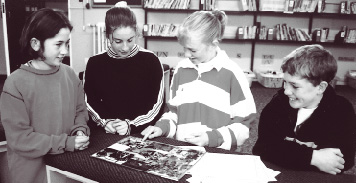| : Introduction | |
The assessments included 7 tasks, four of which asked students to consider how and why people's individual or collective actions might affect relationships with others or features of the environments in which they live and work. The other three tasks asked them to consider some of the causes and consequences of change and environmental differences on people's lives. Two tasks were identical for both year 4 and year 8. One task had identical content for both years, but the method for recording student responses changed from year 8 to year 4. The other three tasks were attempted either by year 4 or by year 8. Three tasks have been selected as link tasks, to be used again in the year 2001, and therefore are not described in detail here. The other tasks are released tasks for which full details are given. The chapter presents the assessment tasks in the following order:
|
|
 Year 8 students
were more successful than year 4 students on both
Year 8 students
were more successful than year 4 students on both